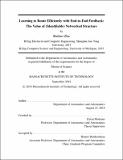Learning to route efficiently with end-to-end feedback : the value of (identifiable) networked structure
Author(s)
Zhu, Ruihao, S. M. Massachusetts Institute of Technology
DownloadFull printable version (500.6Kb)
Other Contributors
Massachusetts Institute of Technology. Department of Aeronautics and Astronautics.
Advisor
Eytan Modiano.
Terms of use
Metadata
Show full item recordAbstract
In this thesis, we introduce efficient algorithms which achieve nearly optimal instance-dependent and worst case regrets for the problem of stochastic online shortest path routing with end-to-end feedback. The setting is a natural application of the combinatorial stochastic bandits problem, a special case of the linear stochastic bandits problem. We show how the difficulties posed by the large scale action set can be overcome by the networked structure of the action set. Our approach presents a novel connection between bandit learning and shortest path algorithms. Our main contribution is a series of adaptive exploration algorithms that achieves nearly optimal O ((d²ln(T)+d³) [delta]max=[delta]²min) instance-dependent regret and Õ(d [square root]T) worst case regret at the same time. Driven by the carefully designed Top-Two Comparison (TTC) technique, the algorithms are efficiently implementable. We also conduct extensive numerical experiments to show that our proposed algorithms not only achieve superior regret performances, but also reduce the runtime drastically.
Description
Thesis: S.M., Massachusetts Institute of Technology, Department of Aeronautics and Astronautics, 2018. This electronic version was submitted by the student author. The certified thesis is available in the Institute Archives and Special Collections. Cataloged from student-submitted PDF version of thesis. Includes bibliographical references (pages [71]-73).
Date issued
2018Department
Massachusetts Institute of Technology. Department of Aeronautics and AstronauticsPublisher
Massachusetts Institute of Technology
Keywords
Aeronautics and Astronautics.